- 22 April 2016
- Middle East
-
(중동) 누가 이슬람의 사복 윤리경찰인가?국제문제/중동 2016. 4. 24. 23:07
출처: http://www.bbc.com/news/world-middle-east-36101150
Who are Islamic 'morality police'?
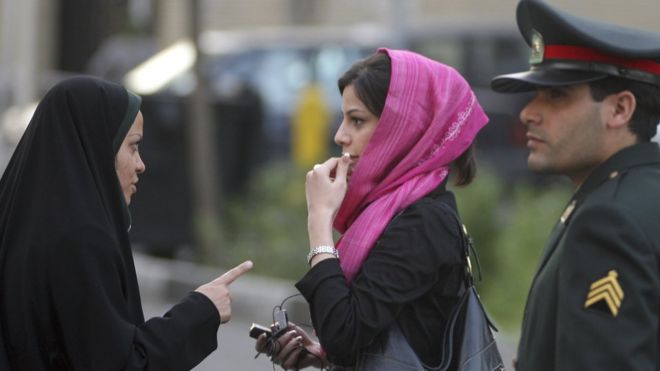 AFP
AFPWearing your headscarf too daringly in Iran can result in a telling off by the morality police News that Iran has deployed thousands of undercover agents to enforce rules on dress has cast the spotlight on an institution that is a major feature of daily life in several Muslim-majority countries.
Police forces tasked with implementing strict state interpretations of Islamic morality exist in several other states, including Saudi Arabia, Sudan and Malaysia.
Many - especially those with an affinity with Western lifestyles - chafe against such restrictions on daily life, but others support the idea, and growing religious conservatism has led to pressure for similar forces to be created in countries that do not have them.
Here are some places where "morality police" forces patrol:
IRAN
Name: Gasht-e Ershad (Persian for Guidance Patrols), supported by Basij militia
Who they are: Iran has had various forms of "morality police" since the 1979 Islamic Revolution, but the Gasht-e Ershad are currently the main agency tasked enforcing Iran's Islamic code of conduct in public.
Their focus is on ensuring observance of hijab - mandatory rules requiring women to cover their hair and bodies and discouraging cosmetics.
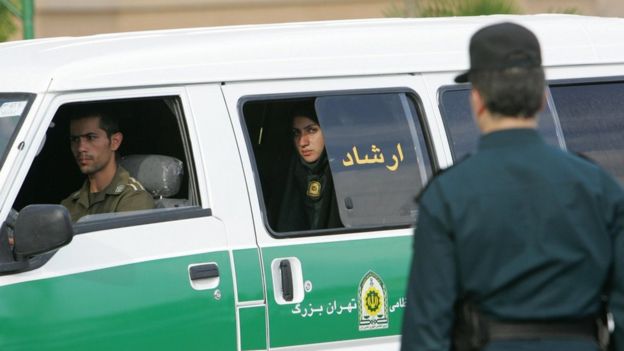 AFP
AFPThe Gasht-e Ershad were formed during a crackdown on "un-Islamic" dress in 2007 They are empowered to admonish suspects, impose fines or arrest members of the public, but under reforms that come into force this year, will soon no longer be able to do any of these things.
Instead, 7,000 undercover Gasht-e Ershad agents will be deployed to report suspected transgressions to the police, who will decide whether to take action.
The Gasht-e Ershad is thought to draw a lot of its personnel from the Basij, a hard-line paramilitary unit; it also includes many women.
What people think: They are mainly seen as a scourge for urban women - usually from wealthier social groups - who try to push the boundaries of the dress code.
This includes wearing the headscarf as far back on the head as possible, or by wearing looser clothing, especially in the heat of summer, although men sporting "Western" hairstyles are also at risk.
Fear of encountering them has even prompted the creation of Android app that helps people avoid Gasht-e Ershad mobile checkpoints.
President Hassan Rouhani has expressed opposition to the Gasht-e Ershad, but Iran's constitution gives him little sway over the security forces.
SAUDI ARABIA
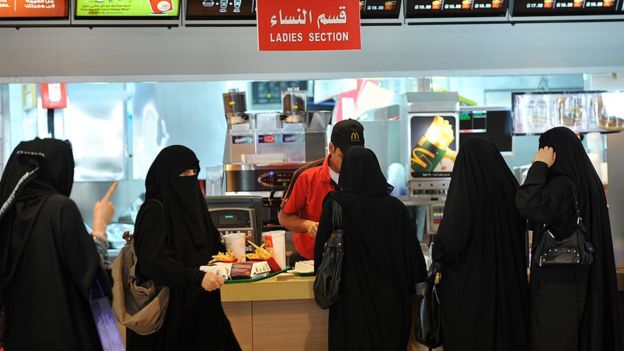 AFP
AFPPublic socialising between unmarried men and women is not permitted in Saudi Arabia Name: Committee for the Promotion of Virtue and the Prevention of Vice, or Mutawa (Arabic for Particularly obedient to God)
Who they are: Formed in 1940, the Mutawa is tasked with enforcing Islamic religious law - Sharia - in public places.
This includes rules forbidding unrelated males and females to socialise in public, as well as a dress code that encourages women to wear a veil covering all but their eyes.
Instead of a police-style uniform, they wear a traditional Saudi robe and keffiyeh.
What people think: Although the Mutawa is widely disliked among liberals and the youth, general opinion in the conservative Sunni-majority kingdom supports it.
But even conservatives have been irritated by recent high-profile cases deemed excessive or internationally embarrassing, such as an actor being charged for letting fans take selfies with him, or a female mannequin being seized because of its clothing.
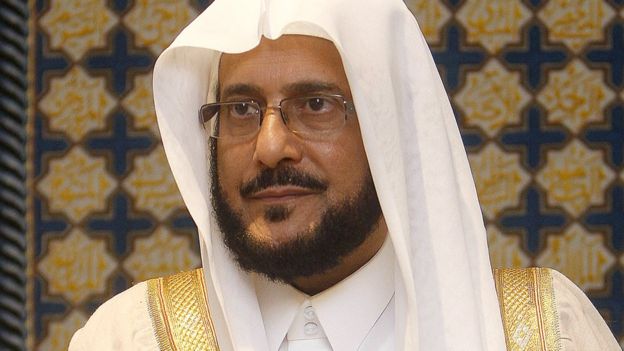 AFP
AFPAbdul Latif Abdul Aziz al-Sheikh - Mutawa head between 2012 and 2015 - was seen as a relative reformist Perhaps in response to this criticism, the authorities have curbed the force's powers, as a result of which it can no longer arrest or pursue people but can only report them to the regular police.
SUDAN
Name: Public Order Police
Who they are: The Public Order Police was set up in 1993 to enforce Sharia enshrined in law for Muslims in the then-northern Sudan by President Omar al-Bashir.
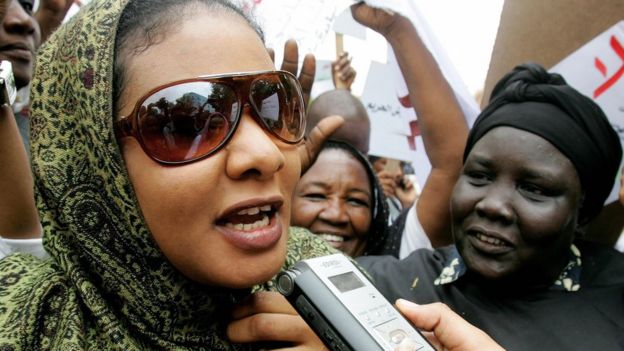 AFP
AFPSudanese journalist Lubna al-Hussein (l) was prosecuted for wearing trousers They have the power to arrest, and suspects are tried - often at speed - in special Public Order Courts; punishments can include flogging or prison.
What people think: Many Sudanese resent their activity as an oppressive and often arbitrary interference in private lives, although some - mostly Salafists and other religious conservatives - support their activities.
The force is known for shutting down private mixed-sex events, upbraiding women for immodest dress and raiding businesses seen as being in breach of Sharia.
It drew international condemnation when female journalist Lubna al-Hussein was arrested and jailed after being caught wearing loose-fitting slacks in public in 2008.
MALAYSIA
Name: Various, usually collectively known as "religious officers"
Who they are: These are bodies run by Malaysia's federal states - or the federal government for federal territories - to enforce Sharia, which applies to the two thirds of the population who are Muslim.
They have the power of arrest, and possible offences range from day-time eating during Ramadan to women and men being "in close proximity".
Cases are tried by Sharia courts separate from the ordinary court system.
What people think: Religious officers have often been accused of overstepping their remit - a situation often muddied by ambiguity about which takes precedence in certain cases - normal legislation or Sharia.
In April, religious officers arrested several people during a raid on a transgender group's fundraising event, accusing participants of hosting a beauty pageant, which Muslims were banned from attending by a 1996 fatwa, or Islamic religious decree.
The group denies the accusation.
'국제문제 > 중동' 카테고리의 다른 글
(중동) 투탄카문의 短劍은 운석으로 만들어진 것 (0) 2016.06.03 (중동/이집트) 이집트 대통령 반정부 시위 경고 (0) 2016.04.26 (중동/카타르) 탈출한 호랑이 고속도로에 나타나 사람들 놀래키다 (0) 2016.03.09 (중동) 미국이 주도한 공습에서 희생된 민간인은 얼마나 될까 계산해보면 (0) 2016.02.05 (중동/이란) 미국의 이란 제재조치 해제후 이란과 중국 유대 강화 (0) 2016.01.24